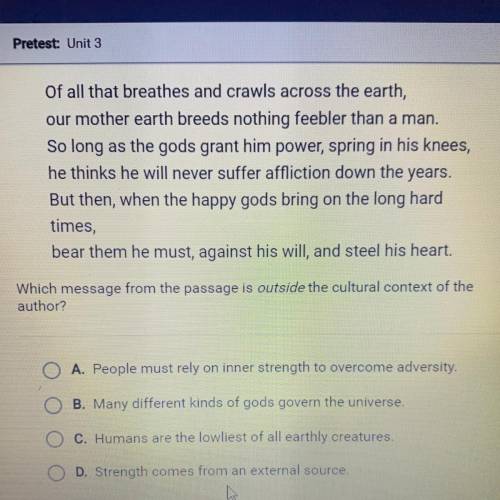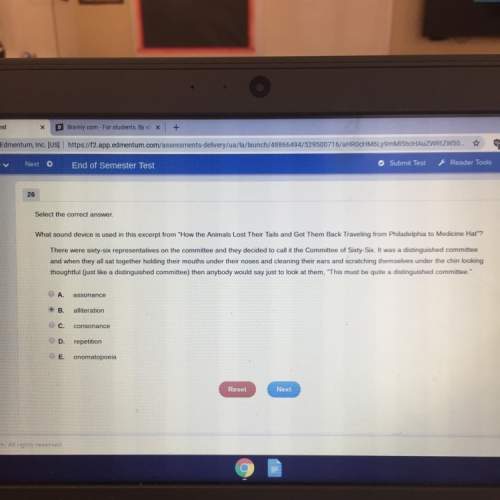
English, 18.12.2020 07:10 Seaisnowblue
Of all that breathes and crawls across the earth,
our mother earth breeds nothing feebler than a man.
So long as the gods grant him power, spring in his knees,
he thinks he will never suffer affliction down the years.
But then, when the happy gods bring on the long hard
times,
bear them he must, against his will, and steel his heart.
Which message from the passage is outside the cultural context of the
author?
A. People must rely on inner strength to overcome adversity.
B. Many different kinds of gods govern the universe.
C. Humans are the lowliest of all earthly creatures.
D. Strength comes from an external source


Answers: 2


Another question on English

English, 21.06.2019 13:30
Commander mckee checked the dials and switches in the shuttle cockpit and determined that they were functioning normally. he then tested the communications systems that connected his ship with the mission control headquarters. he checked the fuel gauges and saw that there was enough fuel for the months-long trip to saturn. all of the other gauges and meters checked out normal, and the idling engines gave off a strong, reassuring hum. after a final glance around, mckee declared that the shuttle was finally ready for takeoff. he readied the brave astronauts under his command and the ground crew alertly awaiting the launch. the rocket took off and, racing through space, eventually arrived at saturn, where commander mckee and his assistants built the first successful human colony. 126 words, 9.8 flesch, 1180 lexile how could a change in emphasis best develop the events in this passage, making for a more interesting and exciting read?
Answers: 1


English, 22.06.2019 03:40
Read this paragraph from chapter 5 of the prince. there are, for example, the spartans and the romans. the spartans held athens and thebes, establishing there an oligarchy: nevertheless they lost them. the romans, in order to hold capua, carthage, and numantia, dismantled them, and did not lose them. they wished to hold greece as the spartans held it, making it free and permitting its laws, and did not succeed. so to hold it they were compelled to dismantle many cities in the country, for in truth there is no safe way to retain them otherwise than by ruining them. and he who becomes master of a city accustomed to freedom and does not destroy it, may expect to be destroyed by it, for in rebellion it has always the watchword of liberty and its ancient privileges as a rallying point, which neither time nor benefits will ever cause it to forget. and whatever you may do or provide against, they never forget that name or their privileges unless they are disunited or dispersed, but at every chance they immediately rally to them, as pisa after the hundred years she had been held in bondage by the florentines. what idea is stressed in the passage? the desire for liberty the establishment of an oligarchy the dismantling of an acquired state the tendency toward rebellion
Answers: 3

English, 22.06.2019 06:00
Which sentence contains the central claim in "compulsory voting: an idea whose time has come" by tor hunter?
Answers: 2
You know the right answer?
Of all that breathes and crawls across the earth,
our mother earth breeds nothing feebler than a ma...
Questions

Computers and Technology, 20.11.2020 14:00


Mathematics, 20.11.2020 14:00

Mathematics, 20.11.2020 14:00




Chemistry, 20.11.2020 14:00

Physics, 20.11.2020 14:00

Biology, 20.11.2020 14:00

History, 20.11.2020 14:00







Computers and Technology, 20.11.2020 14:00


Computers and Technology, 20.11.2020 14:00




